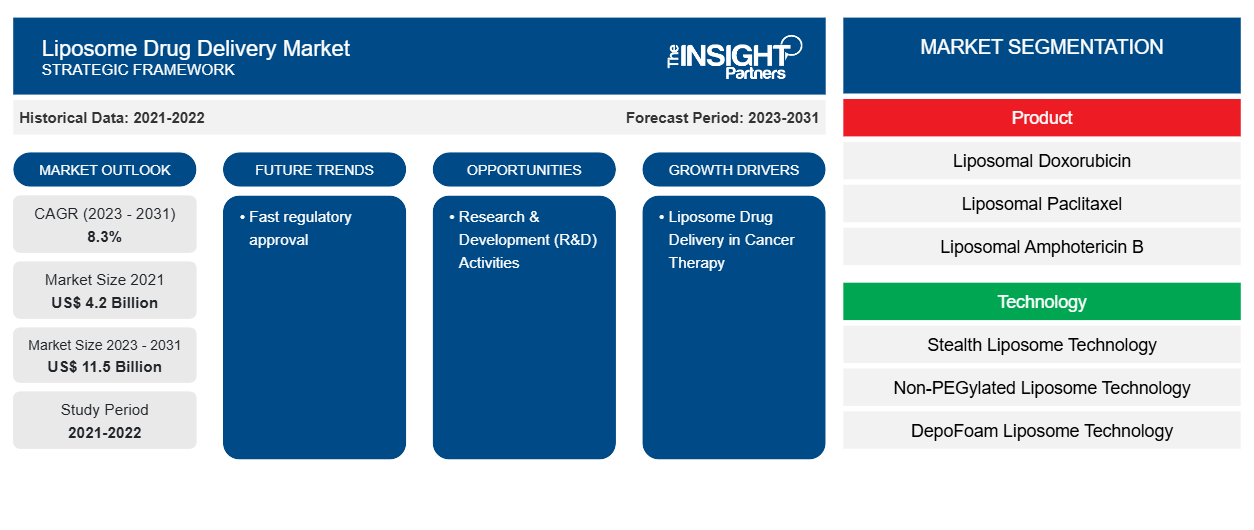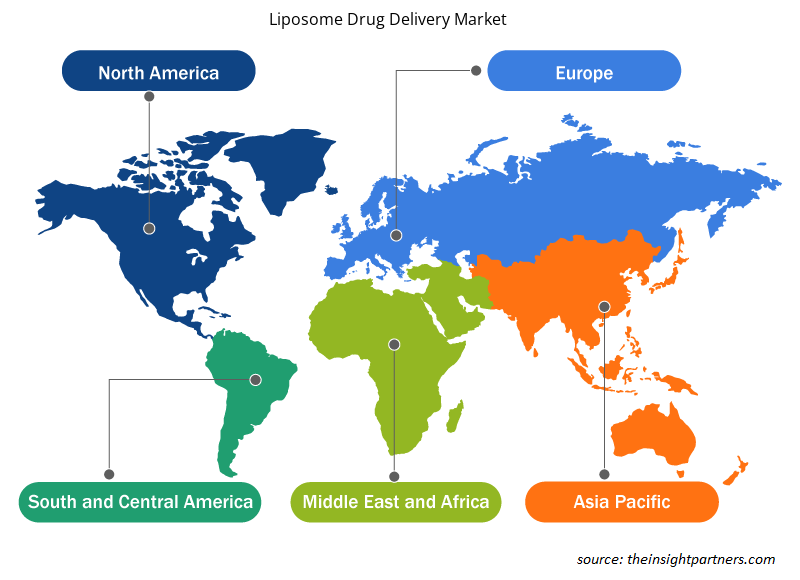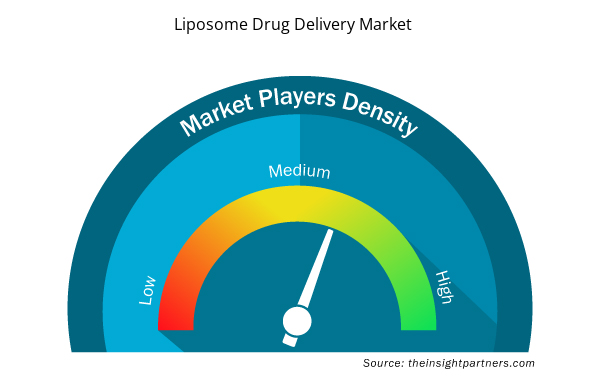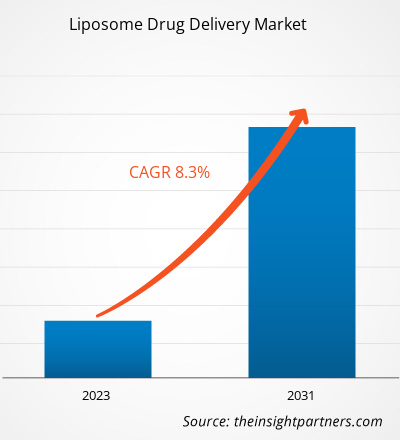The Liposome Drug DeliveryMarket was valued at US$ 4.2 billion in 2021 and is expected to reach US$ 11.5 billion by 2031. The market is expected to register a CAGR of 8.3% from 2023–2031. Fast regulatory approval is likely to remain key Liposome Drug Delivery Market trends.
Liposome Drug DeliveryMarket Analysis
Liposome Drug Delivery in Cancer Therapy
Liposomes have revolutionized cancer therapy due to their broad applications. For example, liposomes were the first nanotechnology-based drug delivery system approved for clinical applications due to their biocompatibility and biodegradability features. Also, liposomes have established themselves in nanocarrier-based drug delivery systems for successful clinical applications of liposomal formulation for anti-cancer therapy. Additionally, liposomal drugs have high encapsulation properties, showing significant anticancer activity by decreasing toxicity and, specifically, cardiotoxicity. Such liposomal treatment encapsulation technique (encapsulation) shows great prolonged circulation similar to "Daunorubicin" and "Pegylated Liposomal Doxorubicin". The aforementioned factors are responsible for influential liposome drug delivery market growth during 2021-2031.
Liposome Drug DeliveryMarket Overview
Technology, innovation, and smart technological solutions such as continue to influence liposome drug delivery significantly. Liposome drug delivery in cancer therapy and efficient product launches for liposome drug deliveryare the most influential factors responsible for Liposome Drug Delivery Market growth. Fast regulatory approval is a key trend for Liposome Drug Delivery Market growth. Research & Development (R&D) activitieswill provide lucrative market opportunity.
Customize This Report To Suit Your Requirement
You will get customization on any report - free of charge - including parts of this report, or country-level analysis, Excel Data pack, as well as avail great offers and discounts for start-ups & universities
Liposome Drug Delivery Market: Strategic Insights

- Get Top Key Market Trends of this report.This FREE sample will include data analysis, ranging from market trends to estimates and forecasts.
You will get customization on any report - free of charge - including parts of this report, or country-level analysis, Excel Data pack, as well as avail great offers and discounts for start-ups & universities
Liposome Drug Delivery Market: Strategic Insights

- Get Top Key Market Trends of this report.This FREE sample will include data analysis, ranging from market trends to estimates and forecasts.
Liposome Drug DeliveryMarket Drivers and Opportunities
Efficient Product Launches for Liposome Drug Delivery to Favor Market
- In October 2021, Evonik announced the launching of the next-generation "LIPEX EXTRUDER" for fast and effective liposomal drug manufacturing. LIPEX provides high throughput and faster batch production times for liposomal drug delivery formulations.
- In January 2022, Pfizer and Acuitas Therapeutics announced a strategic collaboration for Acuita's "Lipid Nanoparticle (LNP) Technology" for potential utilization. The technology holds promise for both vaccine and therapeutic development, focussing on Pfizer's commitment to innovative solutions and paying the way for novel advancements in the field.
Therefore, efficient product launches and strategic collaboration for liposome drug delivery will contribute significantly in the coming years.
Research & Development (R&D) Activities for Liposome Drug Delivery Market– An Opportunity
The top manufacturers developing liposome drug delivery are capitalizing focus on R&D activities for developing nanomaterials, nanospheres, liposomes, and nanoparticles. Such liposome drug delivery can leverage in-vivo and in-vitro drug activities for routine clinical practices. Since the discovery of first-generation liposomes, lipid nanoparticles (LNPs) have evolved tremendously with high adoption in the pharmaceutical industry. For example, Stimuli-responsive liposomes are another approach currently under investigation that enhances drug delivery in tumors, whereas they are designed to be released under certain physiochemical or biochemical stimuli. Examples include "Doxorubicin," "5-fluorouracil", and "AMD3100". Additionally, future research involves a number of Phase 1/2 clinical trials currently investigating LNP formulation as a cancer immunotherapy target for solid tumors, including melanoma, adult glioblastoma, gastrointestinal cancer, and genitourinary cancer, focussing on broad clinical use. Therefore, R&D activities provide lucrative market opportunities accounting considerable market share in the coming years for Liposome Drug Deliverymarket.
Liposome Drug Delivery
Market Report Segmentation Analysis
Key segments that contributed to the derivation of the Liposome Drug Delivery Market analysis are candidature and services.
- Based on Product, the Liposome Drug Delivery Market is segmented into liposomal doxorubicin, liposomal paclitaxel, liposomal amphotericin b, and others. The liposomal doxorubicin may hold a larger market share in 2023.
- Based on Technology, the Liposome Drug Delivery Market is segmented into stealth liposome technology, non-pegylated liposome technology, depofoam liposome technology, lysolipid thermally sensitive liposome. The stealth liposome technology may hold a larger market share in 2023.
- Based on Application, the Liposome Drug Delivery Market is segmented into fungal diseases, cancer therapy, pain management, viral vaccines, and photodynamic therapy. The cancer therapy may hold a larger market share in 2023.
Liposome Drug Delivery Market Share Analysis by Geography
The geographic scope of the Liposome Drug DeliveryMarket report is mainly divided into five regions: North America, Asia Pacific, Europe, Middle East & Africa, and South America/South & Central America.
North America has dominated the Liposome Drug Delivery Market. In North America, US accounts considerable share for liposome drug delivery. Presence of top medical biotechnology and biopharmaceutical players in the US. Additionally, presence of Contract Research Organizations (CROs) is one of the most influential factors responsible for market growth. Asia Pacific is anticipated to grow with the highest CAGR in the coming years.
Liposome Drug Delivery
Liposome Drug Delivery Market Regional Insights
The regional trends and factors influencing the Liposome Drug Delivery Market throughout the forecast period have been thoroughly explained by the analysts at Insight Partners. This section also discusses Liposome Drug Delivery Market segments and geography across North America, Europe, Asia Pacific, Middle East and Africa, and South and Central America.

- Get the Regional Specific Data for Liposome Drug Delivery Market
Liposome Drug Delivery Market Report Scope
| Report Attribute | Details |
|---|---|
| Market size in 2021 | US$ 4.2 Billion |
| Market Size by 2031 | US$ 11.5 Billion |
| Global CAGR (2023 - 2031) | 8.3% |
| Historical Data | 2021-2022 |
| Forecast period | 2023-2031 |
| Segments Covered |
By Product
|
| Regions and Countries Covered | North America
|
| Market leaders and key company profiles |
Liposome Drug Delivery Market Players Density: Understanding Its Impact on Business Dynamics
The Liposome Drug Delivery Market is growing rapidly, driven by increasing end-user demand due to factors such as evolving consumer preferences, technological advancements, and greater awareness of the product's benefits. As demand rises, businesses are expanding their offerings, innovating to meet consumer needs, and capitalizing on emerging trends, which further fuels market growth.
Market players density refers to the distribution of firms or companies operating within a particular market or industry. It indicates how many competitors (market players) are present in a given market space relative to its size or total market value.
Major Companies operating in the Liposome Drug Delivery Market are:
- Takeda Pharmaceutical Company Limited,
- Novartis,
- Luye Pharma Group,
- Ipsen Pharma,
- CELSION, Inc.,
- Astellas Pharma, Inc.,
Disclaimer: The companies listed above are not ranked in any particular order.

- Get the Liposome Drug Delivery Market top key players overview
Liposome Drug DeliveryMarket News and Recent Developments
The Liposome Drug DeliveryMarket is evaluated by gathering qualitative and quantitative data post primary and secondary research, which includes important corporate publications, association data, and databases. The following is a list of developments in them market for Liposome Drug Delivery and strategies:
- In June 2022, Endo Internal Plc's subsidiary company "Endo Ventures Limited (EVL)" and Taiwan Liposome Company, Ltd. (TLC) announced collaboration to commercialize "TLC599" an investigational product by TLC. Currently, TLC599 is an injectable compound designed to address osteoarthritis knee pain showcasing the continuous efforts to advance treatment options in the therapeutic area.
Liposome Drug DeliveryMarket Report Coverage and Deliverables
The “Liposome Drug DeliveryMarket Size and Forecast (2021–2031)” report provides a detailed analysis of the market covering below areas:
- Market size and forecast at global, regional, and country levels for all the key market segments covered under the scope
- Market dynamics such as drivers, restraints, and key opportunities
- Key future trends
- Detailed PEST/Porter’s Five Forces and SWOT analysis
- Global and regional market analysis covering key market trends, major players, regulations, and recent market developments
- Industry landscape and competition analysis covering market concentration, heat map analysis, prominent players, and recent developments
- Detailed company profiles
- Historical Analysis (2 Years), Base Year, Forecast (7 Years) with CAGR
- PEST and SWOT Analysis
- Market Size Value / Volume - Global, Regional, Country
- Industry and Competitive Landscape
- Excel Dataset



Report Coverage
Revenue forecast, Company Analysis, Industry landscape, Growth factors, and Trends

Segment Covered
Product ; Technology ); Application

Regional Scope
North America, Europe, Asia Pacific, Middle East & Africa, South & Central America

Country Scope
Aregntina, Australia, Brazil, Canada, China, France, Germany, India, Italy, Japan, Mexico, Saudi Arabia, South Africa, South Korea, Spain, United Arab Emirates, United Kingdom, United States

 Get Free Sample For
Get Free Sample For